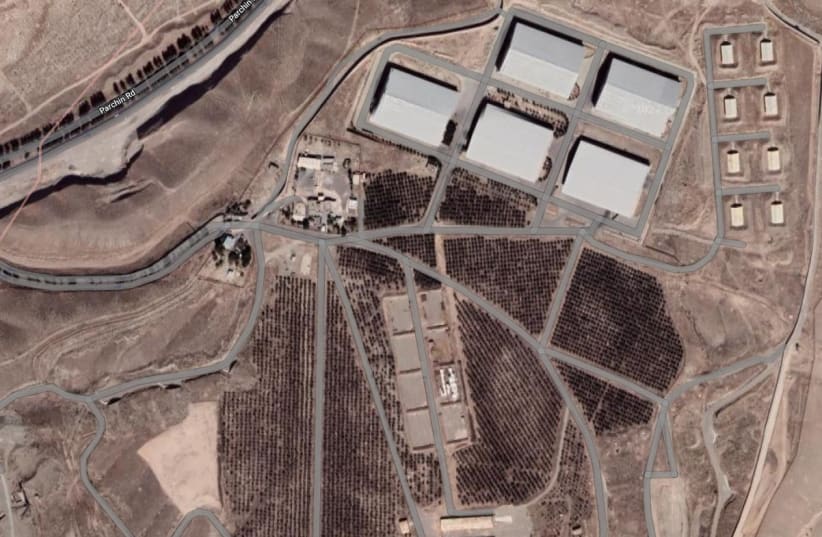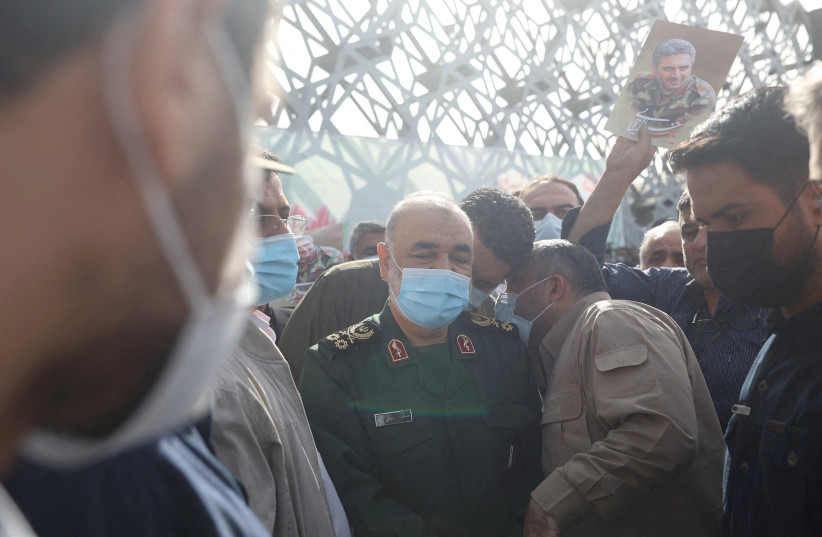A reported "accident" at the Parchin military research center in Iran was actually a drone attack, the New York Times reported three Iranians with knowledge of the attack and one US official as saying on Friday.
An Iranian engineer was killed and another employee was injured on Wednesday evening in the incident, at the research center that officially belongs to Iran’s Defense Ministry.
The attack was carried out by quadcopter suicide drones, the Iranian sources, who were not authorized to speak publicly, were quoted as saying.
Situated 60 km. (37 miles) southeast of Tehran, Parchin is a sensitive military site housing several industrial and research units. It is where Western intelligence services believe Iran carried out tests related to nuclear bomb detonations more than a decade ago.
Ehsan Ghadbeigi, a mechanical engineer, was identified as the person killed in the incident. His colleague who was injured was taken to the hospital to be treated for his injuries.
Iranian media had earlier reported that an “industrial accident” had killed one person and injured another in a factory in the Parchin area, citing an “informed source.”
This is not the first explosion to hit the Parchin area. In June 2020, an explosion was reported in the area that Iranian officials blamed on a gas leak, although later reports claimed the explosion actually occurred at a missile production complex in Khojir, north of Parchin. Another explosion was reported in Parchin in 2014.
On Thursday afternoon, a large fire broke out at a plastic-injection factory in the Tehranpars area of Tehran, according to Iranian reports. Video and photos reportedly from the scene showed a large smoke cloud that could be seen from a distance.
وضعیت عجیب #تهرانپارس@khov_lia pic.twitter.com/yXeNOQ7SlG
— KIAN MELI (@KianMeli1) May 26, 2022
Latest in series of explosions and fires in Iran
In the past two years, a series of explosions and fires have hit industrial and military sites across Iran. Iranian officials have referred to most of the cases as incidents or accidents, although some reports have claimed that at least some of them involved foul play. Iranian officials have blamed some of the incidents on Israel.
In March, the Islamic Revolutionary Guards Corps fired 12 missiles from Iran toward what they claimed was a site used by the Mossad in Erbil in northwestern Iraq. The attack was reportedly carried out in response to an alleged Israeli drone strike on an IRGC drone base in Mahidasht in western Iran.
A number of explosions have also been reported at the Natanz and Karaj nuclear sites in the past two years. Iranian officials at first called the incidents accidents, and later blamed Israel for the explosions.
Nuclear talks remain stalled
The incident at Parchin comes as talks to return to the 2015 JCPOA nuclear agreement have stalled in recent weeks. Rob Malley, the Biden administration’s special representative to Iran, stated on Wednesday that prospects for reaching a nuclear deal with Iran “are tenuous at best.”
In response to a question about Malley’s comments, Iranian Foreign Minister Hossein Amir-Abdollahian stated at the World Economic Forum in Davos on Thursday that the messages Iran is receiving from the US privately are a “little bit different” than the messages being expressed publicly.
Amir-Abdollahian added that the talks were stalled because Tehran did not feel confident that the US would not release economic restrictions on Iran. He stressed that the discussion concerning the IRGC’s terrorism designation are only a small part of the talks.
“This FTO thing – the Israeli side made it public, magnified it and now this issue is being portrayed as the main hurdle,” said the foreign minister, referring to the US Foreign Terrorist Organizations list.
The foreign minister added that while Iran had recently put a new initiative on the table, it feels that “[US President] Joe Biden is facing some kind of inaction. I hope that the American side will act and behave realistically... We are very serious about reaching a strong and good and lasting deal, and we are committed to it. Our nuclear program is totally peaceful. This is the American side that has to make the decision.”
Amir-Abdollahian stressed that Iran feels that former President Donald Trump’s “maximum pressure policy” is still being used, and that while the Islamic Republic is leaving the window of diplomacy open, it feels that “the national interests of the US have been taken hostage by the Zionists.”Reuters contributed to this report.
Assassinated IRGC colonel led efforts to assassinate opponents of Iran
The explosion in Parchin also comes only a few days after a member of the Islamic Revolutionary Guards Corps' Quds Force involved in planning attacks on Jews and Israelis worldwide, Colonel Hassan Sayad Khodayari, was assassinated in Tehran.
According to the IRGC, Khodayari operated in Syria. The Wall Street Journal reported on Thursday that the colonel planned kidnappings and killings as part of the Quds Force's Unit 840. He recruited agents around the world, including in Colombia and Cyprus, and aimed to harm both Israelis and other foreigners viewed as hostile by Iran.
The WSJ report, citing "people familiar with the matter," stated that Khodayari was involved in the failed plot to kill Israeli businessmen in Cyprus last year. He also attempted to target a US general in Germany, an Israeli diplomat in Turkey and French writer Bernard-Henri Lévy. In April, a video emerged reportedly showing Mossad agents interrogating an IRGC official named Mansour Rasouli, who admitted to being involved in the attempted assassinations of the three.
The assassination, which occurred on Sunday, was attributed to Israel in a New York Times report last night. Israeli defense figures expressed surprise at the publication of the responsibility claim, as Israel and the US have a close intelligence relationship, under which a news item like this wouldn't have reached the press, they asserted, according to Israeli media.
Reuters contributed to this report.

